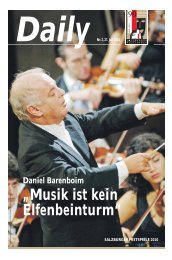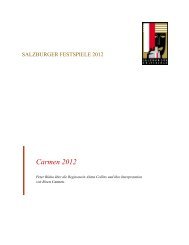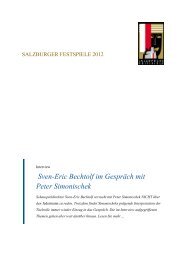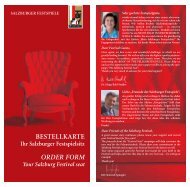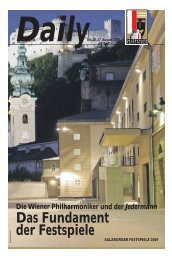Programmfolder Pfingstfestspiele 2013 - Salzburger Festspiele
Programmfolder Pfingstfestspiele 2013 - Salzburger Festspiele
Programmfolder Pfingstfestspiele 2013 - Salzburger Festspiele
Sie wollen auch ein ePaper? Erhöhen Sie die Reichweite Ihrer Titel.
YUMPU macht aus Druck-PDFs automatisch weboptimierte ePaper, die Google liebt.
4 Dissolution and its toll<br />
That is precisely the path of the New Testament, and indeed therein lies its truly revolutionary<br />
message: in the figure and way in which Jesus worked, human beings are presented<br />
with a god who neither needs nor wants any sacrifices. The “father” of Jesus<br />
follows the people who have lost themselves, he does not extort any additional sacrifices<br />
from them so that reconciliation can be possible. The people are and remain his<br />
sons, his daughters, no matter what happens – that is the entire belief of Jesus. Basically<br />
he would like to take each individual person by the hand and lead them back to the<br />
lost Paradise of an original trust in the justification of their own being, past the two guarding<br />
angels with the flaming sword, who, looking backwards, register the image<br />
of God as something menacing, and because of fear drive people further and further<br />
away to a god-less and merciless world experience. On the other hand, whoever in his<br />
attitude to God returns to the origin of childlike trust, certainly does not need any more<br />
sacrifices.<br />
Yet he himself inevitably becomes the victim of all the former compulsions to offer up<br />
sacrifice. People will be mortally offended by the freedom and happiness he spreads.<br />
What can he do? There is the caste of priests, which aims to gain power and fortune<br />
with the fear of God and with the feelings of guilt that are inculcated into the people –<br />
the temples with the slaughter-houses of their handed-down sacrificial rituals are the first<br />
banks, which transform piety into money, by aiming to enrich themselves by human<br />
guilt through divine business. Anyone who conveys a god who needs no sacrifices,<br />
questions the entire religious hierarchy – it appears to be superfluous, a hindrance, indeed<br />
damaging. It infects and impregnates the entire life with a fear that constantly requires<br />
new acts of sacrifice and indeed for that reason cannot come to an end. And<br />
what is left over of the hierarchy of the powerful when the subjects refuse to continue<br />
to serve as slaughter animals for their noble economic and political interests? A state that<br />
demands sacrifices from its citizens puts itself in place of God. He is not the authority<br />
who has to decide who is desirable and who not. Power should serve the people, not<br />
people for their part serve power. Is it surprising that in the state and church, in society<br />
and in religion attempts will be made to destroy a form of piety and humanity, which<br />
appears free of sacrifice, because it is incompatible with the “fundamental law” of cohabitation.<br />
It is and was not the will of God that Jesus had to sacrifice himself on the<br />
Cross for the sins of mankind. Quite the contrary, it is and was the latent and openly<br />
lurking obsessions of fear of people who could not allow themselves to imagine a life<br />
without sacrifices, who killed him. Jesus became their victim, and everyone who follows<br />
in his traces will become one.<br />
Let it be understood, however, that such a person does not, as one may believe,<br />
sacrifice himself, he does not again enter the atavism of the archaic logic of sacrificial<br />
priests and army commanders. He is rather on the point of opening up the exit from the<br />
slaughter-houses of prehistory, and of course he himself perseveres in so doing. He<br />
remains loyal against any kind of opposition; he does not throw himself away to the<br />
12<br />
former fear, he goes through it into a sphere of real life. Even if he may be killed for it –<br />
it will not refute his being, his truth, the reason from which he exists; at most it will reveal<br />
it. Ultimately they can all see it: it is often unavoidable, to risk the utmost for the sake of<br />
one’s own conviction; yet to sacrifice oneself – one is not allowed to do that. It is often<br />
essential to do without some things for the sake of a commission that one recognises<br />
as sense and aim, yet nothing will be lost, one will thereby gain oneself. Harvesting<br />
contradiction and opposition is often unavoidable but in so doing it becomes more<br />
apparent what is truly valid and has substance.<br />
5 The world of opera<br />
What is truly valid and has substance – from a religious point of view that is the belief<br />
alone in the unconditional love of God. In comparison operas are like fairy-tales; even<br />
when they sing about “god”, they symbolically set to music an emotional state of human<br />
feelings. Unconditional love – that is what they all believe in, those who in operas by<br />
Bellini, Verdi, Puccini, precisely because they love, by means of the rigid, inhuman<br />
“order” of a world consisting of greed, violence and arrogated grandeur are driven to<br />
death. Yes indeed, the honour of their venerable families demands that the Capulets<br />
and Montecchis are not allowed to tolerate Romeo and Julia staying together while they<br />
are still alive; the former animosity between Nubians and Egyptians drives Aida and<br />
Radames – whose love could bring peace and reconciliation between the nations – to<br />
die together; and Violetta, who has fallen by the wayside, la traviata, is only allowed to<br />
receive Alfredo’s love when it is finally too late. Tosca will plunge to her death when she<br />
is forced to realise that the hoped-for faked execution of Cavaradossi has become<br />
bloody reality. Love? Obviously it should not live in a cynical and ruthless world. Yet if<br />
this is how things turn out, it is preserved in death. That is what they all believe and why<br />
they all live dying on stage.<br />
Then it can be that love is really found only when it has discarded the outer shell of<br />
expectations of happiness. This is what Bellini’s Norma shows. The national interests of<br />
Rome, the pride of the Gauls, the code of honour of the Druids, the ideal of chastity of<br />
the Irmin priestesses – apparently one serves the gods all the more “purely” when one<br />
imposes the duty on oneself to renounce the love of other people – that is the usual<br />
thing. It demands that the Roman Pollione is only allowed to live together secretly with<br />
the Celtic woman Norma and with their two children. However, it then comes to a<br />
contradiction: no longer between the desire for happiness of the individual and the<br />
interests of society but in one’s own inner being. Pollione has fallen freshly in love with<br />
the novice Adalgisa; with him she breaks her most holy promise, she wants to go with<br />
him to Rome but for that alone she would be condemned to death. This again would<br />
be – for this time “only” – the reaction of religion, decency and morality; it would be a<br />
question of “sacrifice” and “renunciation” as always. However, something really new and<br />
unheard of occurs in Norma herself: when Adalgisa, driven by pangs of conscience,<br />
confesses to Norma about Pollione’s new love, the priestess explains, seemingly full of





